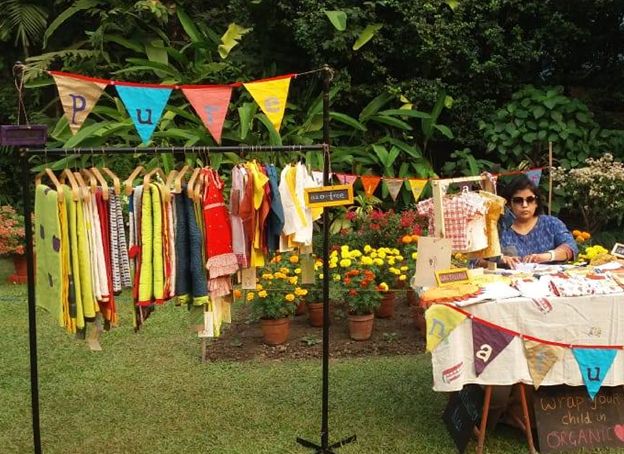New Delhi: 32-year-old Tarandeep Kaur was blessed with a baby girl two months ago. Before her baby was born, Tarandeep in excitement purchased a bag full of clothing for the newborn baby, like most of the new parents. After using the clothing for a few days, Tarandeep had to switch to a different set because the baby girl was outgrowing her clothing incredibly fast. Tarandeep is not alone, thousands of new parents face the same problem. To help these parents minimise wastage – three environmentally conscious friends – an accounts major turned textile designer, Shweta Dhariwal, her sister, Ankita Dhariwal, a graphic designer, and a former-colleague turned friend, Avani Desai who is a visual merchandiser, came together to start a clothing line that is 100 per cent organic, chemical-free and zero-waste.
These women have one common goal in their minds –‘giving back to the society and benefit the environment in whatever way they can’, and that’s why they kick-started an online venture of a clothing line – Whitewater Kids in 2017.
Talking about their journey into sustainable fashion, Shweta Dhariwal, founder of Whitewater Kids said,
We wanted to change the way new-parents dress up their babies. We wanted to play with something that is 100 per cent natural and that will not end up adding to our country’s waste woes. With this thought in our mind, we started Whitewater Kids.
Highlighting how the idea of venturing into sustainable fashion line struck Shweta, she added,
When I was pursuing my studies in designing at National Institute of Design, I was introduced to organic textiles. The idea to bring in the change in the fashion industry through sustainable fashion then hit me and I decided to work towards it. In 2017, I took the first step towards my goal by introducing the idea of starting something like this to my sister who is trained as a graphic designer from London College of Communication and a former colleague Avani. From there we all never looked back, situated geographically at different locations we planned and divided the work based on an individual’s expertise and initiated our start-up.
What Makes Whitewater Kids Different
Explaining how Whitewater Kids is making an eco-friendly difference and how it is different from other infant clothing lines, Shweta adds,
We work closely with women artisans from across India and design unisex clothes that can be worn by both boys and girls. The clothes are made using 100 per cent certified organic cotton and we work with nature-inspired designs, in earthy range of colours that make our products free from all sorts of chemicals and 100 per cent natural. Moreover, our products are mostly hand embroidered, screen prints and block prints which are heavily influenced by Indian folklore and mythology.
Also Read: How A Visit To Mumbai’s Landfill Inspired A 23-Year-Old To Embark On A Zero Waste Journey
Apart from using organic cotton and natural dyes, the way the production and packaging of the clothes are done also focus on being eco-friendly. The products are made with a zero-waste philosophy that means the designs are kept simple and the maximum amount of fabric is used to avoid wastage. After the production phase, the packaging is done using cotton bags made from the production waste itself, thereby ensuring the zero-waste generation down the chain.
Every item at Whitewater Kids is free of plastic and designed keeping reusability in mind. to get more parents used to this sustainable fashion concept for their new-born, the prices of the products have been kept between Rs 500 to Rs 3500.
The idea is to make this fashion acceptable and assessable for all the new parents out there. That is why our clothes starting range has been kept at Rs 500. Moreover, along with clothes, we are also designing a new range of products—like the toys and teethers, using the fabric scraps left over from our bedding and clothing line. The idea is to use whatever waste we are generating through our clothing line within the system and be a 100 per cent waste-free company.
Asserting that the idea for the start-up in this niche segment was one of the most daring decisions of her life, Shweta signed off by saying,
A change is needed, somewhere, someone has to start and take the responsibility of managing the waste our country is generating. We have taken the responsibility towards the environment and we will try to do our best to minimise wastage and make new parents switch to sustainable, eco-friendly clothing for their kids. It will be difficult, it will have its ups and down, but people will switch because what we are doing is the solution for Mother Nature.
NDTV – Dettol Banega Swachh India campaign lends support to the Government of India’s Swachh Bharat Mission (SBM). Helmed by Campaign Ambassador Amitabh Bachchan, the campaign aims to spread awareness about hygiene and sanitation, the importance of building toilets and making India open defecation free (ODF) by October 2019, a target set by Prime Minister Narendra Modi, when he launched Swachh Bharat Abhiyan in 2014. Over the years, the campaign has widened its scope to cover issues like air pollution, waste management, plastic ban, manual scavenging and menstrual hygiene. The campaign has also focused extensively on marine pollution, clean Ganga Project and rejuvenation of Yamuna, two of India’s major river bodies.
































Swayam Prabha
March 20, 2019 at 2:33 pm
One of a kind collection for little ones. Each piece is designed with love and utmost care. Pure range in true sense. Way to go girls … all the best !!